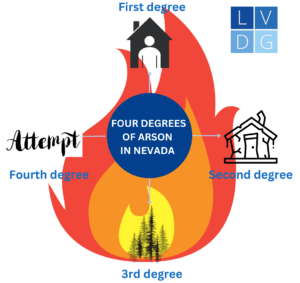1. First-degree arson under NRS 205.010
Nevada law defines first-degree arson as willfully or maliciously setting fire to:
- real estate, buildings, houses, or mobile homes; or
- personal property (such as a motor vehicle) that is occupied by at least one person
It makes no difference whether you own the property. One example of 1st-degree arson is setting a trailer on fire.
As a category B felony, 1st-degree arson carries:
- 2 to 15 years in Nevada State Prison, and
- up to $15,000 in fines (at the judge’s discretion), and
- court costs plus the costs of extinguishing the fire and investigating the matter1
2. Second-degree arson under NRS 205.015
Nevada law defines second-degree arson as willfully or maliciously setting fire to an abandoned building or structure. It makes no difference whether you own the property.
One example of 2nd-degree arson is setting an abandoned house on fire.
Also a category B felony, a 2nd-degree arson case carries:
- 1 to 10 years in prison, and
- up to $10,000 in fines (at the judge’s discretion), and
- court costs plus the costs of extinguishing the fire and investigating the matter2

A potential arson defense is that you did not intentionally set fire to the property.
3. Third-degree arson under NRS 205.020
Nevada law defines third-degree arson as willfully or maliciously setting fire to either:
- unoccupied personal property of another which is valued at $25 or more;
- your unoccupied personal property that another person has a legal interest in; or
- timber, forest, vegetation, shrubbery, or flammable material that you do not own
One example of 3rd-degree arson is throwing a lit match another person’s farm.
A category D felony, third-degree arson carries:
- 1 to 4 years in prison; and
- up to $5,000 in fines (at the judge’s discretion); and
- court costs plus the costs of extinguishing the fire and investigating the matter3
4. Fourth-degree arson under NRS 205.025 and NRS 205.055
Nevada law defines fourth-degree arson as willfully or maliciously attempting to set property on fire. It does not matter what the property is.
Also a category D felony, attempted arson carries:
- 1 to 4 years in prison; and
- up to $5,000 in fines (at the judge’s discretion); and
- court costs plus the costs of extinguishing the fire and investigating the matter
Note that you face an additional category B felony charge under NRS 205.030 if the purpose of the arson was to get money from an insurance company (insurance fraud). The sentence for trying to defraud an insurer through arson includes:
- 1 to 6 years in prison,
- restitution, and
- a fine of up to $5,000 (at the court’s discretion).4

Defenses to arson charges
Here at Las Vegas Defense Group, I have represented literally thousands of people charged with property crimes such as arson. In my experience, two defenses that have proven effective with prosecutors, judges, and juries are that:
- the incident was an accident, and you did not act maliciously; or
- natural causes ignited the fire
Common evidence I rely on includes:
- surveillance video of the area with the fire;
- weather reports that may show dry conditions;
- eyewitness accounts; and/or
- expert testimony from fire specialists
As with every criminal case, the district attorney has the burden to prove guilt beyond a reasonable doubt. If we can show them that their evidence is too weak to sustain a conviction, they may agree to drop the arson charge.
Additional reading
For more information beyond Nevada arson laws, refer to the following:
- Arson Prevention – Safety tips compiled by the Nevada Department of Public Safety.
- Nevada Fire Info – Current conditions re. fires in Nevada, including maps and webcams.
- Fire Marshal Bureaus in Nevada – Links to Nevada’s Investigations/Enforcement Bureau, Fire Protection Engineering Bureau, Nevada Fire Service Training Bureau, and Fire Licensing, Permitting, Prevention and Data Bureau.
- Nevada Fire Loss and Fire Department Profile – Nevada fire losses as reported through the National Fire Incident Reporting System (NFIRS), by the U.S. Fire Administration.
- Nevada Fire Information – Current information about fire-fighting capabilities by the U.S. Bureau of Land Management.
Legal References
- NRS 205.010. See also State v. Second Judicial Dist. Court of Nev. (2020) 462 P.3d 671.
- NRS 205.015. See also Bishop v. Sheriff, Clark County (1972) 88 Nev. 580.
- NRS 205.020. See also United States v. Espinoza (9th Cir., 2020) 816 Fed. Appx. 82.
- NRS 205.025. NRS 205.055. See also McKenna v. Sheriff of Clark County (1968) 85 Nev. 524.


